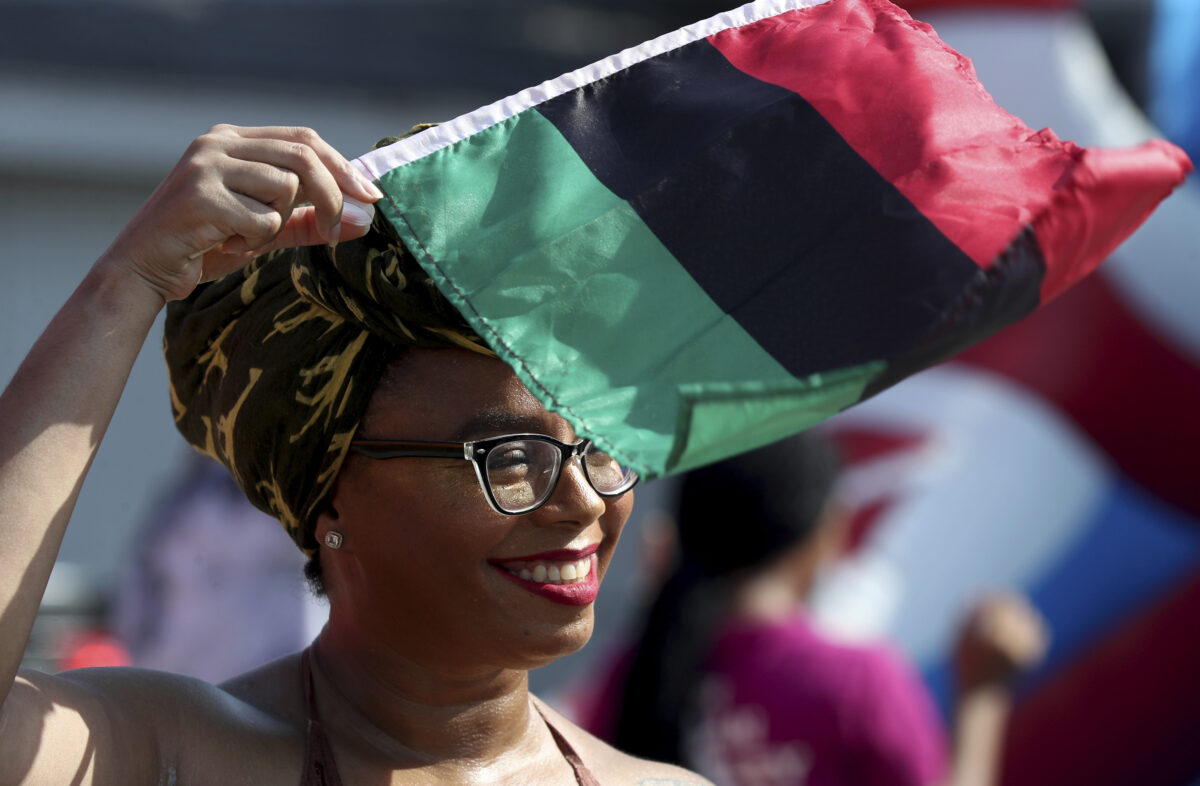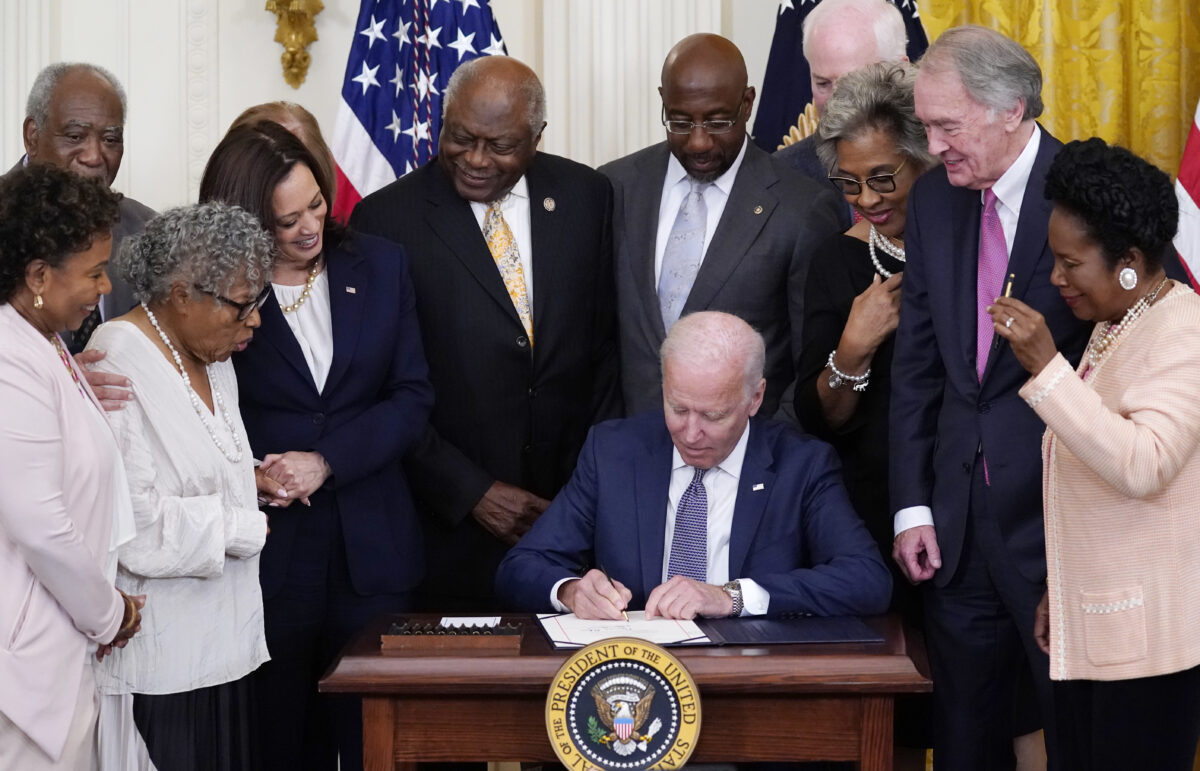Why Filipino Americans need to care about ‘Juneteenth’

FILE – Crystal Baziel holds the Pan-African flag Monday, June 19, 2023, during Reedy Chapel A.M.E Church’s annual Juneteenth Family Fun Day, in Galveston, Texas. Many Americans are celebrating Juneteenth, marking the day in 1865 when the last enslaved people in the US learned they were free. For generations, Black Americans have recognized the end of one of history’s darkest chapters with joy, in the form of parades, street festivals, musical performances or cookouts. (Jennifer Reynolds/The Galveston County Daily News via AP, File)
On Father’s Day, how many times did you tell your Dad that his wish was your command?
I know, it can get old fast. But it’s just for a day. And Dad has earned it.
Too bad it doesn’t work that way with another holiday, Juneteenth (June 19th).
Descendants of slaves don’t get to demand anything of the descendants of masters. At least not without a fight.
Perhaps, that’s why we all get the day off in the middle of the week to think about the history of Juneteenth. When the holiday was passed in 2021, more than 60 percent had no clue about Juneteenth. It hasn’t gotten all that much better, though there seems to be a push to commercialize Juneteenth like other holidays.
We don’t need Juneteenth greeting cards. What we need is to read up on our shared but forgotten American history.
On Sept. 22, 1862, President Lincoln after the Battle of Antietam signed the preliminary Emancipation Proclamation. It was the warning to the Confederacy that change was coming in January 1863, when the emancipation would take effect and slaves would really be free.
But as they say in TV ads, “some restrictions apply.” And there were some restrictions when it came to border states that allowed slaves. It resulted in a slow roll of freedom that took until 1865 for everyone to get the word. There was no excuse. Slow wi-fi? The lack of Black Twitter? It took the US Army to come into Texas June 19, 1865 and tell slaveholders the law had changed and that the slaves had been working overtime.
Imagine having to spend more than two years as slaves, when in most of America, slaves were free men and women. It causes what I dub a kind of legal and political dysphoria – where the concept of a free democratic society just doesn’t add up to the reality.
It may seem strange for 1865, but look at how a similar kind of legal dysphoria continues to this very day.
Texas today
How did Texas slaves feel in 1865? Just ask how women feel in Texas and around the country as they fight for their reproductive rights in a split America.
In California, an abortion is a guaranteed right prior to viability of the fetus, or when necessary to protect the life or health of the woman.
Ironically, that’s not the case in Texas, where a chapter of the Texas Health and Safety Code prohibits abortions outright, with an exception when a woman’s life is at risk.
But even that is a lie.
“Exceptions to abortion bans are a fiction,” Lauren Miller testified before the Senate Judiciary Committee last week. “They don’t exist in Texas and I am living proof of that.”
Miller had been pregnant with twins when she saw the effect of the law that she said “stripped” away her bodily autonomy to make the decisions she needed.
After 12 weeks of pregnancy, Miller learned one of the twins would not survive, and that she herself was at risk of damage to her kidneys and brain.
But no one in Texas would give her the care she needed. “I still wasn’t dead enough for an exception for abortion care in Texas,” she testified.
Miller was forced to flee to Colorado, where abortion is legal 700 miles away, all the while fearing being turned in by an abortion bounty hunter.
These are the stories of today’s legal dysphoria.
Women in Texas need a Juneteenth fix.
And it’s not just abortion
Last week, when a federal judge struck down a Florida law that blocked gender-affirming care for transgender minors and restricted treatment for adults, it exposed another strange rights contradiction in America.
Only 14 states and DC protect the rights to medical care for trans people (California, Washington, Oregon, Colorado, New Mexico, Minnesota, Illinois, New York, New Jersey, Maryland, Connecticut, Massachusetts, Vermont and Maine).
At least 25 other states have restrictions or bans on those same rights.
And yes, Texas is one of those states restricting gender-affirming care.

FILE – President Joe Biden signs the Juneteenth National Independence Day Act, in the East Room of the White House, Thursday, June 17, 2021, in Washington. From left, Rep. Barbara Lee, D-Calif, Rep. Danny Davis, D-Ill., Opal Lee, Sen. Tina Smith, D-Minn., obscured, Vice President Kamala Harris, House Majority Whip James Clyburn of S.C., Sen. Raphael Warnock, D-Ga., Sen. John Cornyn, R-Texas, Rep. Joyce Beatty, D-Ohio, Sen. Ed Markey, D-Mass., and Rep. Sheila Jackson Lee, D-Texas. (AP Photo/Evan Vucci, File)
If you had the day off on Juneteenth, the federal holiday signed into law by Joe Biden in 2021, I hope you celebrated the end of slavery and connected to the history of being a slave in a state in an America when everyone else is free.
But then think of the contradictory laws that still divide America today when it comes to abortion and transgender care.
Far from a perfect union, in some ways some parts of America are just like Texas between 1862 and 1865. Stuck in the past and in need of some emancipation today, too many in our country could use a little modern “Juneteenth” right now.
Emil Guillermo is a journalist and commentator who writes a column for Inquirer.net’s US Channel. Through the years, he’s covered race and politics in Hawaii, California, Texas and Washington, DC, where he was host of NPR’s “All Things Considered.” Contact him at www.amok.com. See him on YouTube.com/@emilamok1

